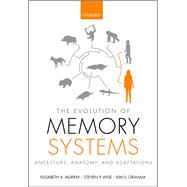The Evolution of Memory Systems Ancestors, Anatomy, and Adaptations
, by Murray, Elisabeth; Wise, Steven; Graham, Kim- ISBN: 9780198817130 | 0198817134
- Cover: Paperback
- Copyright: 12/5/2017
Current theories about human memory have been shaped by clinical observations and animal experiments. This doctrine holds that the medial temporal lobe subserves one memory system for explicit or declarative memories, while the basal ganglia subserves a separate memory system for implicit or procedural memories, including habits. Cortical areas outside the medial temporal lobe are said to function in perception, motor control, attention, or other aspects of executive function, but not in memory.
'The Evolution of Memory Systems advances dramatically different ideas on all counts. It proposes that several memory systems arose during evolution and that they did so for the same general reason: to transcend problems and exploit opportunities encountered by specific ancestors at particular times and places in the distant past.
Instead of classifying cortical areas in terms of mutually exclusive perception, executive, or memory functions, the authors show that all cortical areas contribute to memory and that they do so in their own ways-using specialized neural representations. The book also presents a proposal on the evolution of explicit memory. According to this idea, explicit (declarative) memory depends on interactions between a phylogenetically ancient navigation system and a representational system that evolved in humans to represent one's self and others. As a result, people embed representations of themselves into the events they experience and the facts they learn, which leads to the perception of participating in events and knowing facts.
'The Evolution of Memory Systems is an important new work for students and researchers in neuroscience, psychology, and biology.
'The Evolution of Memory Systems advances dramatically different ideas on all counts. It proposes that several memory systems arose during evolution and that they did so for the same general reason: to transcend problems and exploit opportunities encountered by specific ancestors at particular times and places in the distant past.
Instead of classifying cortical areas in terms of mutually exclusive perception, executive, or memory functions, the authors show that all cortical areas contribute to memory and that they do so in their own ways-using specialized neural representations. The book also presents a proposal on the evolution of explicit memory. According to this idea, explicit (declarative) memory depends on interactions between a phylogenetically ancient navigation system and a representational system that evolved in humans to represent one's self and others. As a result, people embed representations of themselves into the events they experience and the facts they learn, which leads to the perception of participating in events and knowing facts.
'The Evolution of Memory Systems is an important new work for students and researchers in neuroscience, psychology, and biology.






